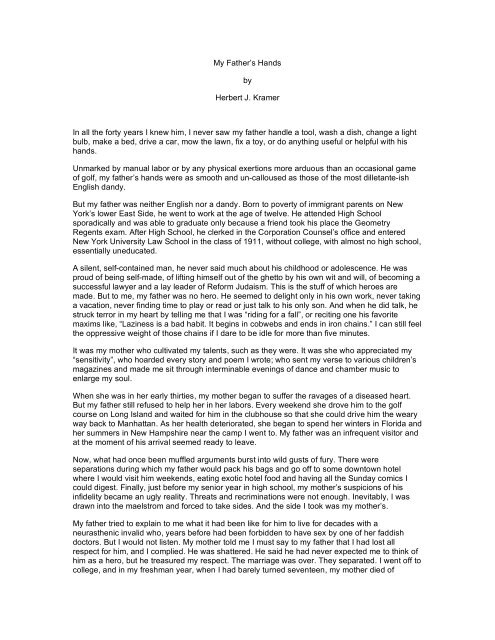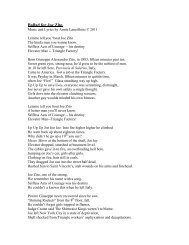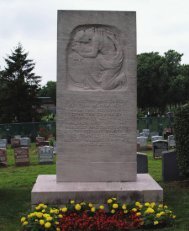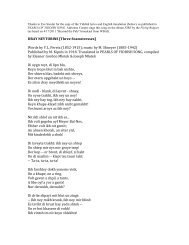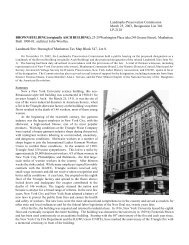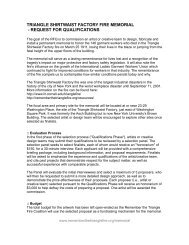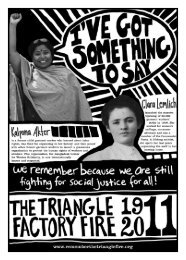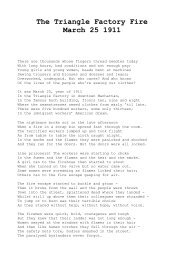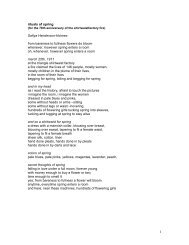My Father's Hands by Herbert J. Kramer In - Remember the Triangle ...
My Father's Hands by Herbert J. Kramer In - Remember the Triangle ...
My Father's Hands by Herbert J. Kramer In - Remember the Triangle ...
Create successful ePaper yourself
Turn your PDF publications into a flip-book with our unique Google optimized e-Paper software.
<strong>My</strong> Fa<strong>the</strong>r’s <strong>Hands</strong><br />
<strong>by</strong><br />
<strong>Herbert</strong> J. <strong>Kramer</strong><br />
<strong>In</strong> all <strong>the</strong> forty years I knew him, I never saw my fa<strong>the</strong>r handle a tool, wash a dish, change a light<br />
bulb, make a bed, drive a car, mow <strong>the</strong> lawn, fix a toy, or do anything useful or helpful with his<br />
hands.<br />
Unmarked <strong>by</strong> manual labor or <strong>by</strong> any physical exertions more arduous than an occasional game<br />
of golf, my fa<strong>the</strong>r’s hands were as smooth and un-calloused as those of <strong>the</strong> most dilletante-ish<br />
English dandy.<br />
But my fa<strong>the</strong>r was nei<strong>the</strong>r English nor a dandy. Born to poverty of immigrant parents on New<br />
York’s lower East Side, he went to work at <strong>the</strong> age of twelve. He attended High School<br />
sporadically and was able to graduate only because a friend took his place <strong>the</strong> Geometry<br />
Regents exam. After High School, he clerked in <strong>the</strong> Corporation Counsel’s office and entered<br />
New York University Law School in <strong>the</strong> class of 1911, without college, with almost no high school,<br />
essentially uneducated.<br />
A silent, self-contained man, he never said much about his childhood or adolescence. He was<br />
proud of being self-made, of lifting himself out of <strong>the</strong> ghetto <strong>by</strong> his own wit and will, of becoming a<br />
successful lawyer and a lay leader of Reform Judaism. This is <strong>the</strong> stuff of which heroes are<br />
made. But to me, my fa<strong>the</strong>r was no hero. He seemed to delight only in his own work, never taking<br />
a vacation, never finding time to play or read or just talk to his only son. And when he did talk, he<br />
struck terror in my heart <strong>by</strong> telling me that I was “riding for a fall”, or reciting one his favorite<br />
maxims like, “Laziness is a bad habit. It begins in cobwebs and ends in iron chains.” I can still feel<br />
<strong>the</strong> oppressive weight of those chains if I dare to be idle for more than five minutes.<br />
It was my mo<strong>the</strong>r who cultivated my talents, such as <strong>the</strong>y were. It was she who appreciated my<br />
“sensitivity”, who hoarded every story and poem I wrote; who sent my verse to various children’s<br />
magazines and made me sit through interminable evenings of dance and chamber music to<br />
enlarge my soul.<br />
When she was in her early thirties, my mo<strong>the</strong>r began to suffer <strong>the</strong> ravages of a diseased heart.<br />
But my fa<strong>the</strong>r still refused to help her in her labors. Every weekend she drove him to <strong>the</strong> golf<br />
course on Long Island and waited for him in <strong>the</strong> clubhouse so that she could drive him <strong>the</strong> weary<br />
way back to Manhattan. As her health deteriorated, she began to spend her winters in Florida and<br />
her summers in New Hampshire near <strong>the</strong> camp I went to. <strong>My</strong> fa<strong>the</strong>r was an infrequent visitor and<br />
at <strong>the</strong> moment of his arrival seemed ready to leave.<br />
Now, what had once been muffled arguments burst into wild gusts of fury. There were<br />
separations during which my fa<strong>the</strong>r would pack his bags and go off to some downtown hotel<br />
where I would visit him weekends, eating exotic hotel food and having all <strong>the</strong> Sunday comics I<br />
could digest. Finally, just before my senior year in high school, my mo<strong>the</strong>r’s suspicions of his<br />
infidelity became an ugly reality. Threats and recriminations were not enough. <strong>In</strong>evitably, I was<br />
drawn into <strong>the</strong> maelstrom and forced to take sides. And <strong>the</strong> side I took was my mo<strong>the</strong>r’s.<br />
<strong>My</strong> fa<strong>the</strong>r tried to explain to me what it had been like for him to live for decades with a<br />
neuras<strong>the</strong>nic invalid who, years before had been forbidden to have sex <strong>by</strong> one of her faddish<br />
doctors. But I would not listen. <strong>My</strong> mo<strong>the</strong>r told me I must say to my fa<strong>the</strong>r that I had lost all<br />
respect for him, and I complied. He was shattered. He said he had never expected me to think of<br />
him as a hero, but he treasured my respect. The marriage was over. They separated. I went off to<br />
college, and in my freshman year, when I had barely turned seventeen, my mo<strong>the</strong>r died of
complications following a minor operation. <strong>My</strong> aunt, who had been with her, said she died of a<br />
broken heart.<br />
When I married at twenty, a college graduate and two weeks out of Officer Candidate School, my<br />
fa<strong>the</strong>r banished and disowned me. He had devoted years to me, he said, now I owed as many<br />
years of my life to him. Marriage was not part of his plan for me. But as we traveled from post to<br />
post, he would send chaplains to find out how I was and ask me to forgive him. Just before I went<br />
overseas, we were reconciled, and in later years he came to love my wife and our children far<br />
more than he had ever loved me.<br />
As a grandfa<strong>the</strong>r to my seven children, as <strong>the</strong> squire of seven lovely acres in North Salem, New<br />
York, he maintained his mandarin detachment. His hands still touched no tool, cleared no brush,<br />
mowed no lawns, changed no diapers. <strong>My</strong> last memory of him, a week before his death at<br />
seventy, is saying good<strong>by</strong>e at North Salem with <strong>the</strong> kids already in <strong>the</strong> car eager to get home. I<br />
stood with him for a last minute beside <strong>the</strong> driveway, kissing his smooth cheek, holding for a<br />
lingering moment his smooth, manicured hand. And I never saw him again.<br />
Can a fa<strong>the</strong>r ever be a hero to his only son? With no o<strong>the</strong>r siblings as buffers between <strong>the</strong>m are<br />
<strong>the</strong>y always too close to <strong>the</strong> truth to be seduced <strong>by</strong> <strong>the</strong> myth? I loved him as a grandfa<strong>the</strong>r to my<br />
children, feared and often despised him as a fa<strong>the</strong>r to me. At <strong>the</strong> end of his life we could reach<br />
out to one ano<strong>the</strong>r in uneasy truce, but at <strong>the</strong> end he was as enigmatic and unexplained as during<br />
<strong>the</strong> years of my growing up.<br />
One day, more than two decades after his death, I was browsing through <strong>the</strong> stacks at Barnes<br />
and Noble when something drew me to a table of remaindered books. A hand seemed to direct<br />
my hand to a small volume entitled “The <strong>Triangle</strong> Fire.” An echo, faint as a whisper rose out of <strong>the</strong><br />
past. There was some connection. Someone had mentioned it. I could not quite recall. But I<br />
picked up <strong>the</strong> book, opened it at random and read <strong>the</strong>se words:<br />
“From <strong>the</strong> roof above <strong>the</strong>m, when it seemed that <strong>the</strong> last <strong>Triangle</strong> survivor had been<br />
rescued, Charles <strong>Kramer</strong> climbed down <strong>the</strong> ladder for a final inspection of <strong>the</strong> roof. He groped<br />
through <strong>the</strong> thick smoke. Flames were now rising on all sides. He heard someone moaning and<br />
moved in <strong>the</strong> direction from which <strong>the</strong> sound seemed to be coming. He found a girl lying across<br />
<strong>the</strong> top steps on <strong>the</strong> grove Street stairway, her head on <strong>the</strong> floor of <strong>the</strong> roof, her hair smoldering.<br />
He smo<strong>the</strong>red <strong>the</strong> sparks in her hair with his hands. He lifter her in his arms and headed back<br />
across <strong>the</strong> roof toward <strong>the</strong> Washington Street ladder. Then he tried to carry her up <strong>the</strong> ladder to<br />
<strong>the</strong> higher roof. But because she was unconscious, he had to wrap long strands of her hair<br />
around his hands. Dragging her slowly, he made his way up <strong>the</strong> ladder.”<br />
Charles <strong>Kramer</strong>, my fa<strong>the</strong>r. And I wanted to say to him, “Dad, on that afternoon of March 25,<br />
1911, your twentieth birthday, you did enough good work with your hands to last a lifetime. Yes. I<br />
respect you. But why didn’t you ever tell me?”<br />
<strong>My</strong> fa<strong>the</strong>r’s hands. Useless hands. Hero’s hands.


